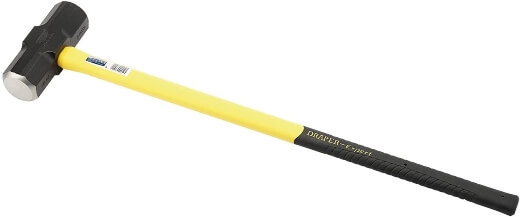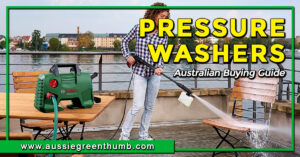I was amazed last week to find out that one of my best friends had just one hammer. I asked around, and apparently, it’s the norm, so I’m on a mission to get people thinking about the type of hammers they’re using and make sure they’ve got the best hammer for each and every job.
Choosing the right hammer isn’t just about swinging a nail into a wall, it’s about how delicately you can disassemble furniture, or restore woodwork without damaging cornicing and detail.
Hammers deserve more attention than they get, so if you’re in the market for something new, check out this guide to finding the right hammer for each and every job.
More...
Top Pick

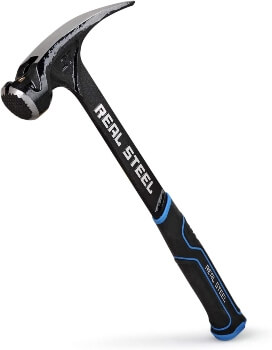
Premium Choice

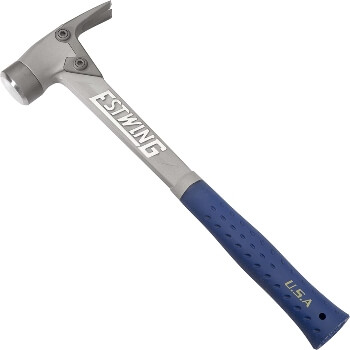
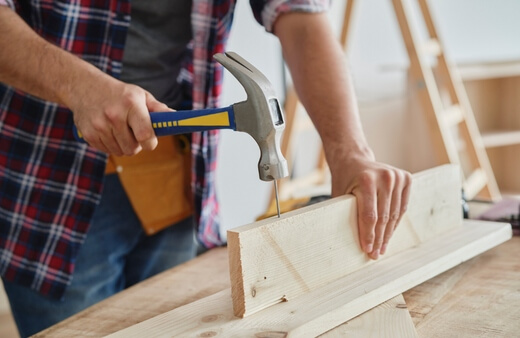
Best Hammers for 2025
Product | Our Rating | Price | |
|---|---|---|---|
1. Real Steel Ultra Framing Hammer with Milled Face | 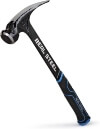 |  | |
2. Esting AL-Pro Aluminum Framing Hammer | 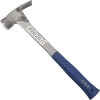 |  | |
3. Jeweltool Planishing/Chasing Hammer | |||
4. Estwing B3-4LB Drilling/Crack Hammer | 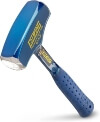 | ||
5. Estwing Rock Pick Geological Hammer | 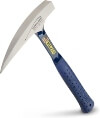 | ||
6. Draper Ball Pein Pin Hammer | |||
7. Estwing E3-16C Curved Claw Hammer | 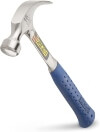 | ||
8. Stanley Proto J1316AVP Antivibe Ball Pein Hammer |  |
Hammers Australian Buyers' Guide
Do you Need Different Hammers for Different Jobs?
99% of people have a claw hammer at home. It’s a simple tool, used for driving nails into timber and soft surfaces and removing them later on, but claw hammers, pick hammers, framing hammers, lump hammers, and everything in between are designed to do some jobs better than others.
We’ve got a full guide below to exactly what each different type of hammer is intended for, and just what they can handle.
Different Types of Hammers
It’s important to understand the different types of hammers, and what they’re actually for. No one hammer should ever be thought of as an all-rounder. Any chippie will tell you that, and you might dismiss it as trade talk, but it’s true.
Lump hammer / Mallet
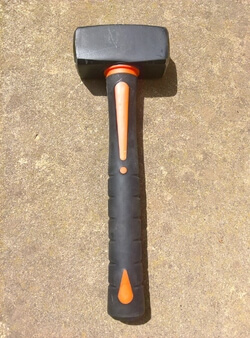
Lump hammers and mallets are, despite their obvious restrictions, one of the few hammers that really is surprisingly multipurpose. From driving stakes to hammer nails, they can do pretty much anything other than detail work.
For basic breaking, metal lump hammers are essential, but rubber mallets can be surprisingly useful for that too, as well as being gentle enough to adjust loose parts and help with laying stone tiles.
Claw hammer
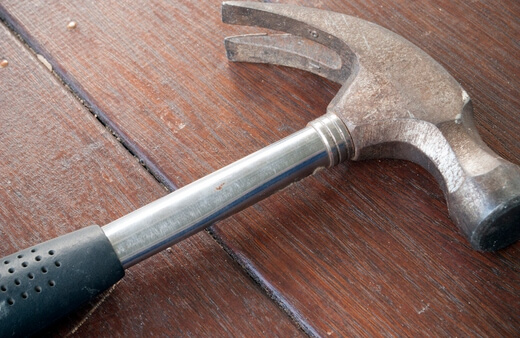
Claw hammers typically come as framing hammers, but it’s also a general term used to describe any hammer with a two-pronged fork on one end of the head. The fork is designed to prize nails from timber and walls without causing damage.
The sharper the claw, the better the claw hammer. Or at least that’s my rule. Finer ends mean less damage if you need to use your claw hammer in a bind to prise apart two pieces of timber or take apart furniture without damaging the edge.
Blunt or rounded claw hammers are safer but will dent the edge of any materials you need to separate.
Framing hammer

Esting AL-Pro Aluminum Framing Hammer


Get Your Free Guide:
Master Growing Australian Natives eBook
A Must Have Complete Guide for Every Australian Garden
Get Your Free Guide:
Master Growing Australian Natives eBook
A Must Have Complete Guide for Every Australian Garden
Don’t be scared off by the name. Framing hammers are the standard hammer most people own. They’ve got one blunt end, typically cast steel, and one clawed end to remove nails. They are designed to be lightweight, ergonomic, and comfortable to use, and no toolbox should be without.
Riveting hammer
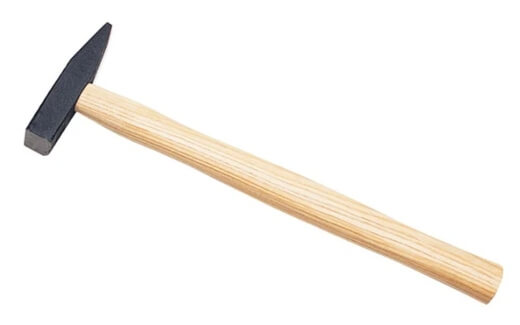
Source: JewelryTooling
Riveting hammers come in all shapes and sizes, from jewellers’ tools to steel working tools. One end should be blunt, with the other as a single tapered point. They can be used to break materials, similar to lump hammers, but are best used to create texture on metals, and (as the name suggests) work rivets into steel without machinery.
Sledge hammer
Sledge hammers are basic tools with one purpose, hitting things hard. It might sound basic, but they are. They’re perfect for demolition work, but also for driving posts into the ground with as little effort as possible thanks to their elongated handles.
Find out how to use a sledge hammer safely and what to look for when buying one by reading our in-depth guide on sledge hammers.
Planishing hammer
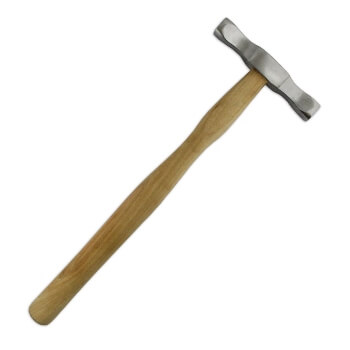
Planishing just means smoothing, flattening, polishing, or adding texture to the finished surface of a material (usually metal). Planishing hammers are sold in a range of patterns and textures, but the most useful are typically called ‘ball’ hammers and are ideal for smoothing out dents in metal, and should be used in combination with rounded surfaces on the opposite surface of the material to avoid further dents.
Pein hammers
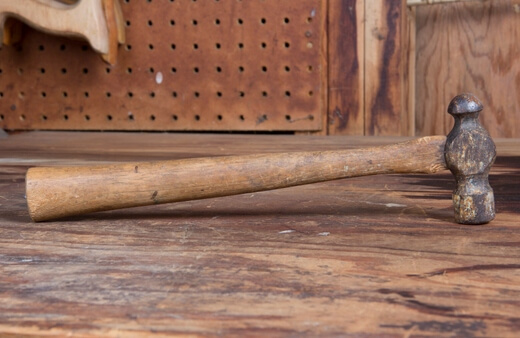
Ball pein hammers, cross, and straight pein hammers, and pin hammers are all designed with metal work and delicate timber work in mind, but they are perfectly adequate for basic DIY and putting nails in walls.
They have one flat side, and a shaped edge on the other, either rounded, flattened, or pointed for lighter joinery work on softer materials.
Pick hammer/rock pick
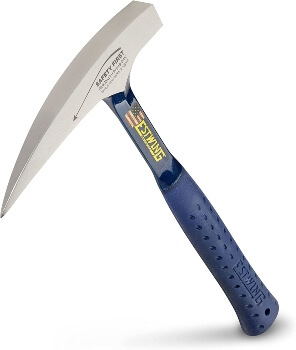
Estwing Rock Pick Hammer
Not all hammers are designed for building, some have just one purpose, and that’s breaking. Pick hammers or rock picks are short versions of pick axes.
Generally, pick hammers have one flat side for simple impact breaking, and a sharp, cast steel pointed end which provides force and pressure on the smallest possible point to work the stone. They are ideal for drystone walling, and intricate stonework in gardens.
Reviews of the Best Hammers in Australia
1. Real Steel Ultra Framing Hammer with Milled Face

Real Steel Ultra Framing Hammer with Milled Face
Real Steel isn’t exactly the world’s best-known tool brand, but I’ve got to say, I’m impressed with this alloy-steel hammer. In no way does Real Steel scrimp on detail, with a heavily gripped milled face to the main section of the hammer head, and a beautifully fine grind on the claw, it’s perfect for most DIY jobs.
And, on top of everything, it’s got that beautiful nail holder for tight spots, that works equally well at removing nails as it does driving them in.
Pros
Cons
2. Esting AL-Pro Aluminum Framing Hammer

Esting AL-Pro Aluminum Framing Hammer
Estwing’s range of hammers is one of the widest ranges of any manufacturer, with hammers to suit specific purposes, but still versatile enough to use around the house for general DIY.
This aluminium framing hammer is gorgeously lightweight, beautifully manufactured, won’t tarnish, and has an insanely comfortable grip. OK, so it’s about ten times more expensive than your average hammer from Bunnings, but let’s face it, you’re not here for the cheap stuff.
The milled claw is ideal for neatly parting timbers, and gets a perfect grip on nails, while the slot at the top of the head is ideal for removing nails from looser, softer materials without damaging them at all.
Pros
Cons
3. Jeweltool Planishing/Chasing Hammer
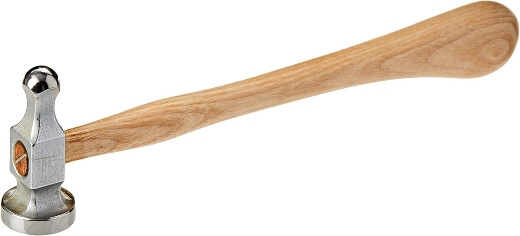
Jeweltool Planishing & Chasing Hammer
I’m never going to rate a planishing hammer higher than a 4, just because they’re not versatile enough, so that 4 stars on here is a good thing, and shouldn’t let you dismiss it.
For metal work, and delicate timber work this nearly formed planishing hammer by Modelcraft is ideal for timberwork, joinery, and metalwork in equal measure.
Like all timber handles hammers, there’s an issue with the head security, as it's just wedged in with a steel wedge, but if you use it as it's unintended you’ll never have any problems.
These are the sorts of tools you pass down to your grandkids, not the ones you abuse!
Pros
Cons
4. Estwing B3-4LB Drilling/Crack Hammer
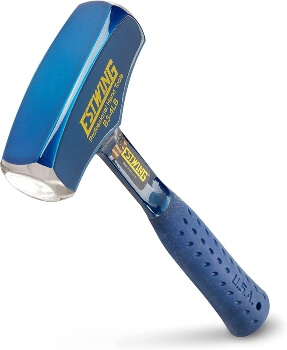
Estwing B3-4LB Drilling & Crack Hammer
Who said lump hammers had to be boring? Estwing’s 4lb crack hammer is astonishingly good, with a heavy body, handle and head, coated in rubber for comfort. If you’re breaking logs with a pick, or wedge, a decent crack hammer like this is exactly what you need!
OK, so you’re not going to be winning any awards for detail if you start using it for day-to-day DIY, but for heavy work, there’s nothing like a well-made steel lump hammer.
Pros
Cons
5. Estwing Rock Pick Geological Hammer

Estwing Rock Pick Geological Hammer
Planning any big garden renovations this year? Why not consider dry stone walling with a simple hammer like this from Estwing, these geological pick hammers are ideal for shaping stone and creating beautifully designed stonework all by yourself.
Perfect for a project, or for heavy-duty stone cracking, there’s nothing else that can rival a pick hammer for the jobs it’s designed for, and I’m struggling to find any brand better placed than Estwing to manufacture these purpose-made tools.
Pros
Cons
6. Draper Ball Pein Pin Hammer
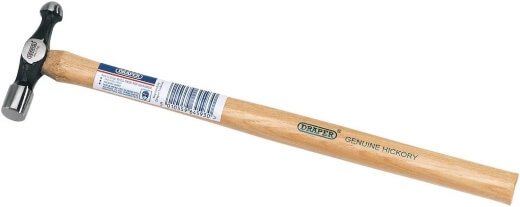
Draper Ball Pein Pin Hammer
Draper’s simple ball pein hammer is ideal for small jobs and comes in a range of sizes. The smaller you get, the gentler you can be, so for putting together photo frames, to building dolls houses (or even the furniture, Draper has a hammer for that!
Ball pein hammers are often seen as clumsy, or un-versatile, but they’re so far from it that I do get a touch frustrated. If you’re keen on craft, you need a delicate ball pein hammer like this Draper one in your toolbox.
Pros
Cons
7. Estwing E3-16C Curved Claw Hammer
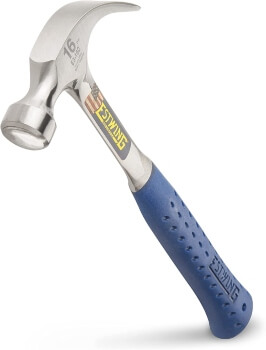
Estwing E3-16C Curved Claw Hammer
Estwing doesn't just make high-end tools, they’ve got some really decent budget options too. Their 16oz shock-resistant claw hammer is ideal for anyone looking for a good, plain hammer that just gets the job done.
There are no frills with this hammer, just a really well-built, affordable tool that will stand the test of time.
Pros
Cons
8. Stanley Proto J1316AVP Antivibe Ball Pein Hammer
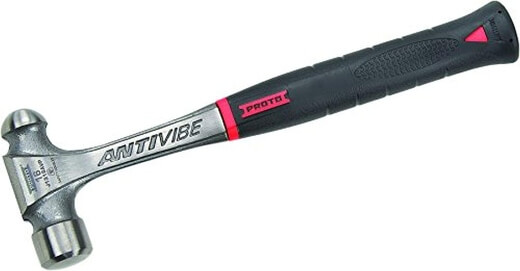
Stanley Proto J1316AVP Antivibe Ball Pein Hammer
Perhaps the nicest ball pein hammer I’ve ever seen has to be this alloy Steel, anti-vibration hammer from Stanley Proto. The handle is cast from one piece of alloy steel, with an incredibly comfortable rubber grip.
And, while it’s not exactly the most important thing when buying a hammer, it just looks good. If you’re like me, and you don’t mind a bit of showing off, then whipping this ball pein out of the toolbox on-site is sure to put a smile on your face.
Pros
Cons
Our Hammer Top Picks for 2025
Top Rated Hammer


I’m surprising myself here if I’m honest, but I really was blown away with how good the Real Steel framing hammer was. They sell a few different shapes and sizes for multiple uses, but this is by far the most multipurpose hammer, with excellent precision, and virtually no chance of inaccuracies thanks to the placement slot, and the strong grip hammer face.
If you’re in the market for a good hammer, on a reasonable budget, you won’t find much better than the Real Steel Ultra Framing Hammer.
Premium Choice Hammer


If money is no object or if you really do need the best hammer for work, then I have to be completely honest and say that it’s going to cost you. This Estwing Aluminium Framing Hammer isn’t cheap, but it’s outstandingly good at its job and does virtually no damage even when separating old timbers for restoration projects.
Frequently Asked Questions About Hammers
What is the most commonly used hammer?
Claw hammers or framing hammers are by far the most common hammers to buy, and can be used for a lot of tasks, but should never be the only hammer in your toolbox.
Claw hammers are ideal for basic jobs like disassembling furniture, driving in nails, and removing nails and tough screws.
What is the best type of hammer for demolition?
Sledgehammers are the best type of hammers for demolition, with heavyweight heads and long handles that help to spread the effort away from just the user’s swing.
They are ideal for demolishing anything from concrete through to timber structures and stonework.
What is the strongest type of hammer?
Steel handles hammers are the strongest type of hammer you can buy, with cast steel bodies that connect directly to the head in a single piece of metal. They are far less likely to break and will last a lifetime with proper care.
Like any steel product, it’s worth cleaning them and keeping them dry at all times to elongate their lifespan.
How long should a hammer last?
Most hammers on the market are sold with a basic warranty, usually for three or five years, but the reality is that any good hammer that costs over $30 should last a lifetime.
Hammers are simple tools, and most are used for specific jobs, meaning that with proper use and maintenance there is no reason they should break, weather, or wear.
What size hammer is best?
The best all-around hammer size is probably a ball pein, which will do most nailing work, and help take those lumps and bumps out of metal too. These lightweight hammers are handy to clip onto a tool belt, and store away in tight spaces too.
What is the most powerful hammer?
Steel-handled or titanium-handled hammers are the strongest and generally most powerful hammers as they are capable of taking more force without breaking. All hammers are technically capable of the same power, but weight and balance are key to a more powerful impact.
Are titanium hammers better than steel?
Titanium is lighter, and tougher than steel and helps to reduce vibrations by about 5%, so you get a better transfer of energy and use less energy when using a titanium hammer. The handle, if the hammer is a single cast piece, will also last longer, and take higher impacts than steel.
Is a longer hammer better?
Longer-handled hammers are better in terms of energy distribution as they exert more pressure from less force. However, they are harder to handle and can be difficult to strike accurately with. If you are considering long handled hammers, make sure you understand the differences in how to use them first.
What can I use instead of a hammer?
For driving nails into walls or even timber, pretty much anything with a solid head will work instead of a hammer, but with far less control or accuracy. Bricks, rolling pins, or even the end of screwdrivers can suffice if you forget to bring your hammer with you (I even saw a colleague using a steel toe-capped boot one!)
Why do mechanics use brass hammers?
Brass is less likely to cause sparks in workshops, particularly against metal, and its softer material properties make it a gentler metal to use for hammer manufacturing, particularly in workshops, which is why most mechanics have a few brass hammers in their tool boxes.
For more hammering jobs, see our product reviews and buyers' guide below:
Get the Right Hammer for Your Needs
If, by some miracle, you’ve found a hammer that’s capable of every job in this article, please do let us know because I’ve yet to find one. Hammers, like any other tool, have specific use cases and are better suited to some jobs than others.
If you’re happy with what you’ve got, that’s fine, but for me, finding the perfect hammer for the right job is super satisfying, and gives me peace of mind knowing I’m always taking proper care with my materials, including my hammers.
Published on December 12, 2022 by Gary Clarke
Last Updated on December 27, 2025

